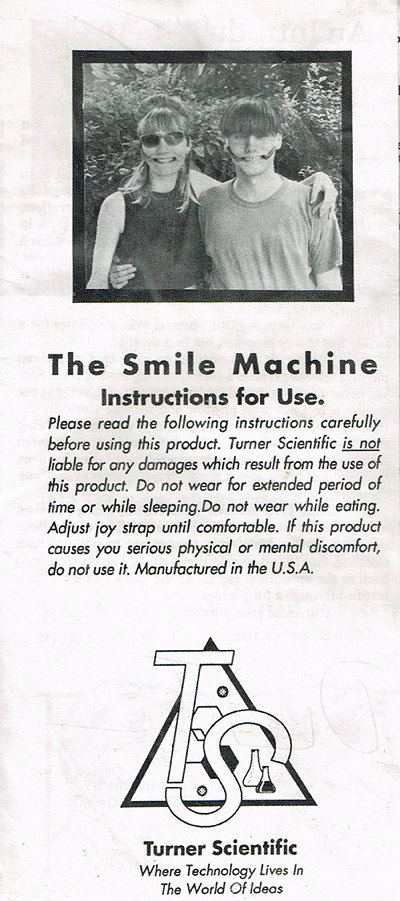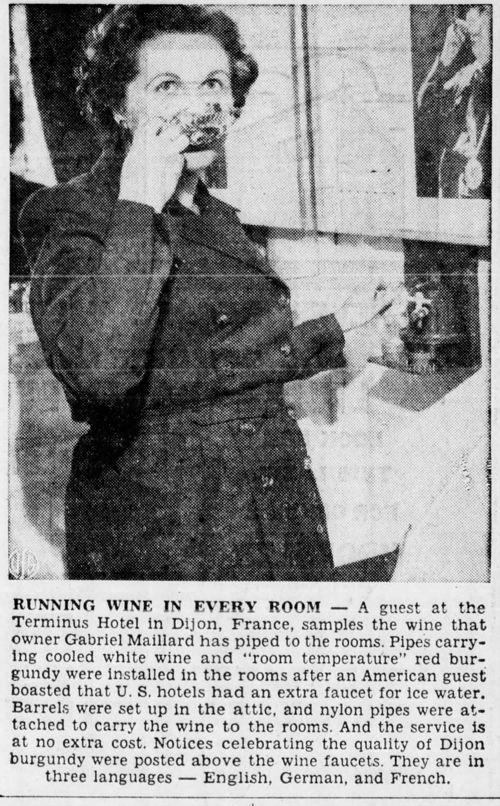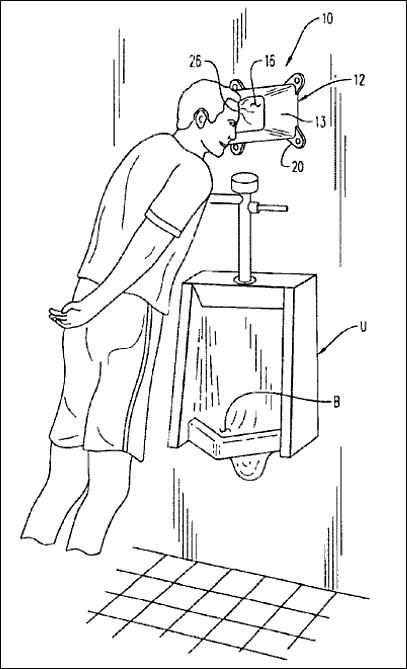Inventions
The Smile Machine
Invented by artist Dick Turner in 1992. The organizers of the 1994 Winter Olympics in Lillehammer then got wind of it, and decided it would be "the perfect way to make light of Norwegians' reputation as a dour people and ordered 100,000 of them for Olympic workers and town residents to wear."But they did this without crediting Turner at all. Nor did they order the smile machines from him. When Turner complained, someone from the Norwegian embassy in Washington called him "and acknowledged that the Smile Machine was his idea but said nothing further could be done about it."
More info: Baltimore Sun (Feb 7, 1994)
Image source: ideoideo


Posted By: Alex - Wed Mar 14, 2018 -
Comments (4)
Category: Inventions, 1990s
Wine on Tap, version 2.0
We've previously we've posted about wine on tap in hotel rooms. Such as the Hotel Terminus in France, which in 1953 ran pipes through the walls to achieve this.There's now a more high-tech alternative. The Plum Dispenser is a $1500 gadget that stores several bottles of wine, but dispenses a glass at a time — allowing hotel guests to buy a single glass in their room rather than a whole bottle. It's basically wine on tap. Though the prices aren't cheap:
$16 for 5 ounces of wine? You could go to a local supermarket and buy an entire bottle for that.
More info: North Bay Business


The Evening Sun (Hanover, Pennsylvania) - Jan 7, 1954
Posted By: Alex - Mon Mar 12, 2018 -
Comments (3)
Category: Inebriation and Intoxicants, Inventions
Urinal Forehead Support

U.S. Patent No. 6,618,419.
Posted By: Alex - Tue Mar 06, 2018 -
Comments (8)
Category: Bathrooms, Inventions, Patents
Glove for Handshaking
Invented by Anthony Monde in 1975, a steel-ribbed glove “for the protection of politicians and others who do a lot of handshaking.”
York Daily Record - July 16, 1975

The Shreveport Times - Oct 12, 1975
Posted By: Alex - Mon Feb 19, 2018 -
Comments (4)
Category: Fashion, Inventions, 1970s
The Sociometer
Invented by three students at the University of Dundee, the Sociometer is designed to measure how much time people at pubs (or in any social environment) are spending on their phones, as opposed to being social. It does this by measuring WiFi activity and recording it on a scrolling piece of graph paper.They tested it in a Dundee pub and found that "people were still attached to their phones even at peak times when they were surrounded by friends."
More info: thesociometer.com, University of Dundee, the scotsman.

Posted By: Alex - Sat Feb 17, 2018 -
Comments (2)
Category: Antisocial Activities, Inventions
Unko Button
New from Japan, the Unko Button. It's a gadget that lets you post on social media about your baby's bowel movements with just a push of a button. It's got two buttons. One for poo, the other for pee.More info: RocketNews24

Posted By: Alex - Sat Dec 30, 2017 -
Comments (4)
Category: Inventions, Body Fluids, Excrement
Greenhouse Helmet
Patented in 1986 by Waldemar Anguita of Brooklyn, NY. And I'm not sure, but this may be Waldemar's Twitter account. After all, how many Waldemar Anguitas of approximately the right age can there be in Brooklyn?Another object is to provide a greenhouse helmet that has air filters so that ambient air containing carbon dioxide will be filtered therethrough and mixed with the carbon dioxide breathed out by the person to be used by the plants.
An additional object is to provide a greenhouse helmet that will contain hearing and speaking devices so that the person can hear within and speak out through the helmet.
A further object is to provide a greenhouse helmet that is economical in cost to manufacture.
A still further object is to provide a greenhouse helmet that is simple and easy to use.

Posted By: Alex - Wed Dec 27, 2017 -
Comments (3)
Category: Inventions, Patents, 1980s
Smile Mirror
Visual Arts student Berk Ilhan has created a mirror that will only work if you smile. His idea was that this would help cheer up cancer patients by forcing them to smile. He's hoping to sell these for between $2000 and $3000 each. So far, the reaction to his invention has been, shall we say, not positive.Some of the reviews: guardian, smh.com.au
Smile Mirror site

Posted By: Alex - Thu Nov 09, 2017 -
Comments (1)
Category: Inventions
Noise-canceling ramen fork
The OTOHIKO fork from Nissin, for noisy ramen slurpers. It doesn't actually cancel out the noise. When it detects a slurping noise it causes your phone to make a louder, wave-crashing sound, which drowns out the slurping sound.It costs ¥14,800. Or around $130.

via mashable.com
Posted By: Alex - Sun Oct 29, 2017 -
Comments (1)
Category: Inventions, Noises and Other Public Disturbances of the Peace, Cacophony, Dissonance, White Noise and Other Sonic Assaults
Filter Queen Vibrator
A 1950s gadget that, when attached to the hose of your vacuum, transformed it into a vibrating massager.

"Directions: The Filter Queen Vibrator should be inserted into the wand end of the hose and the hose fastened to the suction inlet of the Filter Queen... For use, place hose on neck, shoulders or other parts of the body to be massaged. See illustration on opposite side of box."

More info: Herald Tribune
Image source: Flickr
Posted By: Alex - Sat Oct 28, 2017 -
Comments (3)
Category: Inventions, 1950s

| Who We Are |
|---|
| Alex Boese Alex is the creator and curator of the Museum of Hoaxes. He's also the author of various weird, non-fiction, science-themed books such as Elephants on Acid and Psychedelic Apes. Paul Di Filippo Paul has been paid to put weird ideas into fictional form for over thirty years, in his career as a noted science fiction writer. He has recently begun blogging on many curious topics with three fellow writers at The Inferior 4+1. Contact Us |




